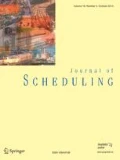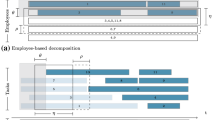Abstract
In the service industry, workers perform work shifts and are assigned to interruptible activities and uninterruptible tasks during their shifts. The work shifts of regular employees are often established several weeks in advance of the operations when the activity and task demands are still uncertain. Just a few days before the operations when these demands are unveiled with more certainty, the planned schedules can be slightly modified and on-call temporary employees can be scheduled to satisfy the demands as best as possible. As acceptable modifications, extending the planned shifts and moving workers’ meal breaks are considered. In this paper, we are interested in the scheduling problem encountered in this second step, which also involves assigning activities and tasks to the scheduled work shifts. To produce good-quality solutions in fast computational times for large-sized instances, we develop a two-phase heuristic. In the first phase, an approximate mixed-integer programming model is used to suggest temporary shifts and extensions to regular shifts and to schedule and assign tasks. In the second phase, a column-generation heuristic embedded in a rolling horizon procedure determines the final shifts and assigns activities to them. Computational results obtained on randomly generated instances are reported to evaluate the validity of the proposed solution method.


Similar content being viewed by others
References
Aykin, T. (1996). Optimal shift scheduling with multiple break windows. Management Science, 42(4), 591–602.
Bard, J. F., Binici, C., & de Silva, A. H. (2003). Staff scheduling at the United States Postal Service. Computers and Operations Research, 30(5), 745–771.
Bard, J. F., Morton, D. P., & Wang, Y. M. (2007). Workforce planning at USPS mail processing and distribution centers using stochastic optimization. Annals of Operations Research, 155(1), 51–78.
Bard, J. F., & Wan, L. (2005). Weekly scheduling in the service industry: an application to mail processing and distribution centers. IIE Transactions, 37(5), 379–396.
Bard, J. F., & Wan, L. (2006). The task assignment problem for unrestricted movement between workstation groups. Journal of Scheduling, 9(4), 315–341.
Bard, J. F., & Wan, L. (2008). Workforce design with movement restrictions between workstation groups. Manufacturing and Service Operations Management, 10(1), 24–42.
Barnhart, C., Johnson, E. L., Nemhauser, G. L., Savelsbergh, M. W. P., & Vance, P. H. (1998). Branch-and-price: Column generation for solving huge integer programs. Operations Research, 46(3), 316–329.
Bechtold, S. E., & Jacobs, L. W. (1990). Implicit modeling of flexible break assignments in optimal shift scheduling. Management Science, 36(11), 1339–1351.
Bouchard, M. (2004). Optimisation des pauses dans le problème de fabrication d’horaires avec quarts de travail. Master’s Thesis. École Polytechnique, Montréal, Canada.
Burke, E. K., Causmaecker, P. D., Berghe, G. V., & Landeghem, H. V. (2004). The state of the art of nurse rostering. Journal of Scheduling, 7(6), 441–499.
Côté, M.-C., Gendron, B., & Rousseau, L.-M. (2011b). Grammar-based integer programming models for multi-activity shift scheduling. Management Science, 57(1), 151–163.
Côté, M.-C., Gendron, B., & Rousseau, L.-M. (2012). Grammar-based column generation for personalized multi-activity shift scheduling. INFORMS Journal on Computing. doi:10.1287/ijoc.1120.0514.
Côté, M.-C., Gendron, B., Quimper, C.-G., & Rousseau, L.-M. (2011a). Formal languages for integer programming modeling of shift scheduling problems. Constraints, 16, 54–76.
Dantzig, G. B. (1954). A comment on Edie’s “Traffic delays at toll booths”. Journal of the Operations Research Society of America, 2(3), 339–341.
Desaulniers, G., Desrosiers, J., & Solomon, M. M. (2005). Column generation. New York: Springer.
Ernst, A. T., Jiang, H., Krishnamoorthy, M., Owens, B., & Sier, D. (2004a). An annotated bibliography of personnel scheduling and rostering. Annals of Operations Research, 127(1–4), 21–144.
Ernst, A. T., Jiang, H., Krishnamoorthy, M., & Sier, D. (2004b). Staff scheduling and rostering: A review of applications, methods and models. European Journal of Operational Research, 153(1), 3–27.
Jin, J. (2009). Pré-affectation des tâches aux employeés effectuant des tâche non-interruptibles et des activités interruptibles. Master’s Thesis. École Polytechnique, Montréal, Canada.
Lequy, Q., Bouchard, M., Desaulniers, G., Soumis, F., & Tachefine, B. (2012a). Assigning multiple activities to work shifts. Journal of Scheduling, 15(2), 239–251.
Lequy, Q., Desaulniers, G., & Solomon, M. M. (2010). Assigning team tasks and multiple activities to work shifts. Technical report, Les Cahiers du Gerad G-2010-71, HEC Montréal, Montréal, Canada.
Lequy, Q., Desaulniers, G., & Solomon, M. M. (2012b). A two-stage heuristic for multi-activity and task assignment to work shifts. Computers & Industrial Engineering, 63(4), 831–841.
Loucks, J. S., & Jacobs, F. R. (1991). Tour scheduling and task assignment of a heterogeneous work force: A heuristic approach. Decision Sciences, 22(4), 719–738.
Lübbecke, M. E., & Desrosiers, J. (2005). Selected topics in column generation. Operations Research, 53(6), 1007–1023.
Omari, Z. (2002). Attribution des activités aux employés travaillant sur des quarts. Master’s Thesis. École Polytechnique, Montréal, Canada.
Vatri, E. (2001). Intégration de la génération de quarts de travail et de l’attribution d’activités. Master’s Thesis. École Polytechnique, Montréal, Canada.
Zhang, X., Chakravarthy, A., & Gu, Q. (2009). Scheduling problem under disruptions in mail processing and distribution centres. Journal of the Operational Research Society, 60(5), 598–610.
Acknowledgments
This research was supported by a collaborative R&D grant offered by Kronos and the Natural Sciences and Engineering Research Council of Canada. The authors wish to thank the personnel of Kronos for their collaboration.
Author information
Authors and Affiliations
Corresponding author
Rights and permissions
About this article
Cite this article
Elahipanah, M., Desaulniers, G. & Lacasse-Guay, È. A two-phase mathematical-programming heuristic for flexible assignment of activities and tasks to work shifts. J Sched 16, 443–460 (2013). https://doi.org/10.1007/s10951-013-0324-2
Received:
Accepted:
Published:
Issue Date:
DOI: https://doi.org/10.1007/s10951-013-0324-2




